By Invitation: May session of China's National People's Congress held in the shadow of escalating China-US conflict
Insightview.eu has invited Joergen Delman, professor, PhD, China Studies, Department of Cross-Cultural and Regional Studies, University of Copenhagen, to write about his takes from China’s annual meeting of the National People’s Congress [NPC] and the simultaneous session of the national advisory body, Chinese People’s Political Consultative Conference [CPPCC].
J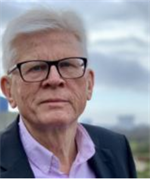 oergen Delman works on China’s political economy, politics, civil society, climate policies and environmental issues. He is a frequent public speaker and media commentator on these topics and has lived in China for ten years, working as a consultant for international development organisations, as well as Danish and international businesses. He has worked extensively with and within Chinese government organisations at central and local level. Joergen Delman is Co-coordinator of ThinkChina.dk.
oergen Delman works on China’s political economy, politics, civil society, climate policies and environmental issues. He is a frequent public speaker and media commentator on these topics and has lived in China for ten years, working as a consultant for international development organisations, as well as Danish and international businesses. He has worked extensively with and within Chinese government organisations at central and local level. Joergen Delman is Co-coordinator of ThinkChina.dk.
The post-COVID19 economic recovery and the new national security legislation for Hong Kong were the two main topics at China’s annual meeting of the National People’s Congress (NPC) and the simultaneous session of the national advisory body,
Chinese People’s Political Consultative Conference [
CPPCC] from May 21-28.
The COVID 19 victory and the economy
China has already won the first stage of its battle against COVID 19 and Li expressed his gratitude to all of those within and outside China who supported China in its battle against the disease, including people in Hong Kong and Taiwan.
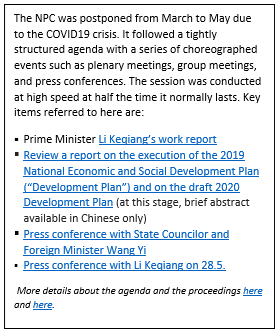
However, the COVID19 came as a shock and sent an unprepared China into economic recession, after the economy had done quite well in 2019 when it grew by 6.1 per cent over 2018. The surveyed unemployment rate in 2019 was below 5.3 per cent. All in all, the economic bottom line was acceptable last year, according to Li. Then, the Corona crisis hit China during the first quarter of 2020. Li did not give specific GDP figures, although they were already available at the time of his speech. In fact, China’s economy
shrunk by 6.8% during Q1 in 2020, the first contraction since 1992. Li Keqiang did not provide much detail on the nature of the economic downturn, and the published abstract of the report on national and economic development in 2019 and the plans for 2020 was not helpful either. Even more, Li noted that it did not make sense to set a specific target for economic growth this year because of the uncertain implications of the corona crisis. This was an unusual decision, and the first time it has happened since the early 1990es when the government started to announce such targets. It has not been an easy decision, since economic growth is seen as a key to social stability in China.
While the leadership will invest heavily in economic recovery, it does not harbour intentions to stimulate new growth through massive infrastructure stimulus packages like in the past. Still, specific budget items aimed at infrastructure development were mentioned in the Premier’s report, such as water conservancy projects and an increase in national railway development capital by 100 billion CNY.
Instead, the overall focus will be on all-round support to economic recovery and the government’s priorities are to ensure stability in: employment, the financial sector, foreign trade, foreign investment, domestic investment, and people’s expectations. This will happen through focused interventions on ensuring: job security, basic living needs, safe operations of market entities, food and energy security, stabilization of industrial and supply chains, and the normal functioning of primary-level governments.
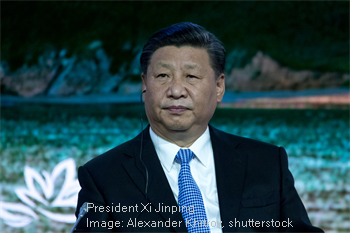
Li listed some tasks and targets for the year that indicated a wish to return to normal: More than 9 million new urban jobs [still less than in 2019]; a surveyed urban unemployment rate of around 6 per cent; CPI increase of around 3.5 per cent; more stable and higher-quality imports and exports; a basic equilibrium in the balance of payments; growth in personal income in step with economic growth; elimination of poverty among all rural residents living below the current poverty line and in all poor counties; effective prevention and control of major financial risks; a further drop in energy consumption per unit of GDP; and the discharge of major pollutants; and accomplishment of the
13th Five-Year Plan.
Li did not discuss the 14th five-year plan [2021-2025] that is under preparation and we do not yet know the specifics of China’s medium-term economic, social and environmental strategies. However, during the NPC session,
South China Morning Post [SCMP] enquired with people in the know and found that the overall idea is to focus on stimulating the national economy through expanded consumption. One Academy of Social Science researcher said: “China now has a middle-income group of between 500 and 700 million people, and that alone can be a source to power Chinese economic growth for the next five years”. Still, China will keep its ‘opening up and reform’ policy framework, ascertained Li, and it will maintain its central place in global supply chains, particularly among Asian and European countries noted South China Morning Post, to offset the rising and real risk of a “decoupling” with the US. The five-year plan will be published next year in March.
Li Keqiang also said that current financial stability policies may be relaxed and that the money supply [M2] may be expanded considerably as compared to 2019. While the government does not want to flush the economy with new money without guidance or restrictions, the current mitigation measures amount to about 2 trillion RMB yuan so far, Li noted at his press conference.
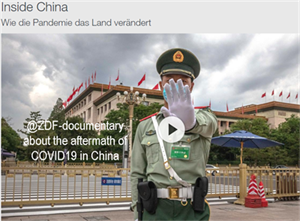
Employment is clearly at the top of the political agenda, since the
CPC fears that unemployment may lead to social instability and possibly unrest. According to
public statistics, the unemployment rate amongst registered urban employees – the only official indicator of unemployment so far - is the highest in 25 years. The figures given are uncertain, however, due to
China’s bifurcated labour market. The unemployment rate of unregistered workers, mainly migrants from rural areas, is unknown. As noted by
Fortune, in 2019, China's government counted 291 million migrant workers. In March 2020, the number had decreased to about 129 million, i.e. 56% of last year’s total. This massive drop indicates hidden mass unemployment in rural areas. The migrant workers’ only social security is their agricultural land, and it will not carry them far. The government will have to ensure that they can recover their jobs or find new employment in the urban sectors soon, otherwise they may become another source of social instability.
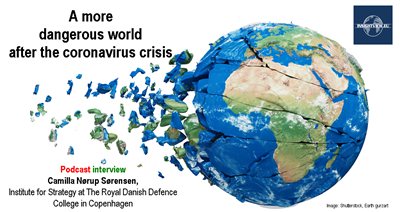
While there are clearly enough to worry about for China’s leadership, Li Keqiang was keen to emphasize at his final press conference that the government’s measures to bring China’s economy back on track were “forceful”. He said that dropping the GDP goal would allow the country to focus on “pressing issues like joblessness and basic livelihoods” and argued, according to
Caixin, that instead of flooding the economy with liquidity, China had decided to increase its budget deficit, issue special bonds, and ease fees and costs for companies, a strategy that aimed to support employment and basic livelihoods, thereby sustaining consumption power and rehabilitating the market”.
COVID 19 and the trade war with the US
The NPC session was held in the shadow of the conflict with the US over China’s handling of COVID19. The Trump administration has intensified its attacks on China and now demands that China take responsibility for the spread of the virus to the US. In fact, there seems to be no end to China’s role in the woes of the US economy, according to the Trump Administration. Still, Li Keqiang mentioned relations to the US only once in his report. He noted that China would work with the United States to implement phase one of the China-US economic and trade agreement and that China will continue: “to boost economic and trade cooperation with other countries to deliver mutual benefits”.

Evidently, Li did not wish to whip up a hostile nationalistic atmosphere towards the US at the session. However, at the final press conference, he admitted that the relationship with the US was complex and challenging, but he also argued that China rejects a so-called “Cold War mentality” and the idea of economic decoupling. Trade between the world’s two largest economies should “continue to follow business rules” and respect market dynamics, Li said.
While trying to reach out to the US by asking for “mutual respect and cooperation”, he recognized that Chinese and American diplomats have repeatedly clashed over the origins of the coronavirus outbreak and failures to control its spread. He also noted that China was open to an international investigation into the sources of the coronavirus and China was a co-sponsor to a resolution to that effect at the recent World Health Assembly.
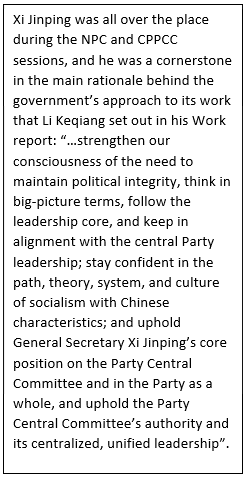
Finally, the U.S. has often criticized China for not being a market economy. There have been similar concerns in the EU. At one of the sessions of the
CPPCC,
Xi Jinping said that the
Chinese economy would never again become a planned economy, thus pushing back against U.S. criticism that the nation has failed to deliver on promised reforms.
While the U.S. Administration does not appear amenable to Chinese assurances on key issues such as COVID19 and China’s market economy status, the relationship may also be threatened further if China does not deliver on the Trade Pact. In fact, the escalating conflict with the US has raised concerns about China’s food security situation inside China. In 2019,
China imported 86% of its soybeans from the US and Brazil. These imports have been hit somewhat by the Corona crisis. Still, China has performed reasonably on the purchase promises so far and imports are expected to rebound this year. However, at the NPC session, a representative from Heilongjiang province, Gu Zhenchun, noted that “…with the escalating trade friction between China and the US and the coronavirus pandemic, the security of edible oil and livestock feed is becoming more prominent” and that: ”substituting for imported soybeans to reduce import dependence has become the focus for government departments and researchers.”
China has also committed to buy US energy products to the order of above $50 billion in US energy exports [mainly oil and natural gas/
LNG] under the trade pact. Still, with the current volatile energy markets, it may be difficult to deliver on the promises due to the comparatively high prices of U.S. energy products. In fact, China had already diversified away from US energy products prior to the Trade Pact. According to the well-known American China energy expert, Elizabeth Economy, China’s leadership is concerned that China will become reliant on the U.S. for a considerable share of its energy security. Still, self-reliance is not an option although
Xi Jinping is in favour of this idea.
The Hong Kong National Security Law
The conflict between China and the US exploded when it was announced that the NPC would impose a National Security Law on Hong Kong. Li Keqiang said in his report that China would establish sound legal systems and enforcement mechanisms for safeguarding national security in Hong Kong and Macao. It is no secret that the Chinese leadership have been upset and concerned about the demonstrations in Hong Kong. The demonstrators [discounting the rioters] have gradually turned toward demanding more democracy and independence. The
Chinese leadership have seen these developments as “notable national security risks in the Hong Kong Special Administrative Region [HKSAR] that have seriously challenged the bottom line of the "one country, two systems" principle, harmed the rule of law, and threatened national sovereignty, security and development interests.”
Article 23 of Hong Kong’s constitution, the Basic Law from 1997, stipulated that the HKSAR should enact such laws on its own to “prohibit any act of treason, secession, sedition, subversion against the Central People's Government, or theft of state secrets, to prohibit foreign political organizations or bodies from conducting political activities in the HKSAR, and to prohibit political organizations or bodies of the HKSAR from establishing ties with foreign political organizations or bodies.” This has never happened, and the
last attempt to pass one was as far back as in 2003. The Chinese leadership has now lost patience with the Hong Kong leadership due to the sustained and increasingly violent unrest, and the NPC session passed a decision that the executive body of the NPC should draft this new law and pass it as soon as possible.
Whereas the decision at the NPC is thus in compliance with current state legislation in Hong Kong and China and supported by many sections of Hong Kong society, there is also strong local opposition to the move and the demonstrations have flared up again despite COVID19 restrictions. It is not likely that
attempts by the Chinese authorities to ascertain that the one country-two systems arrangement will continue to exist after the law will be successful, even if offenders under the new law will eventually not be extradited for prosecution in a Chinese court and trials will follow standard procedures under Hong Kong law with presumed innocence. The fear is that China will establish a parallel security system in Hong Kong.
Even more, the US has criticized the Chinese government and declared that Hong Kong’s political status as an independent territory is over. Together with the governments of Australia, Canada and the United Kingdom, the
White House issued a joint statement on 28 May that declared: “Direct imposition of national security legislation on Hong Kong by the Beijing authorities, rather than through Hong Kong’s own institutions as provided for under Article 23 of the Basic Law, would curtail the Hong Kong people’s liberties, and in doing so, dramatically erode Hong Kong’s autonomy and the system that made it so prosperous. …We are also extremely concerned that this action will exacerbate the existing deep divisions in Hong Kong society; the law does nothing to build mutual understanding and foster reconciliation within Hong Kong….As Hong Kong’s stability and prosperity are jeopardized by the new imposition, we call on the Government of China to work with the Hong Kong SAR Government and the people of Hong Kong to find a mutually acceptable accommodation that will honour China’s international obligations under the UN-filed Sino-British Joint Declaration.”
This declaration may not only lead to more international confrontation. This may also entail severe consequences for Hong Kong, since the U.S. government may choose to remove the economic entitlements that it enjoys under U.S. law as an independent territory. U.S. sanctions against Chinese government officials have also been threatened. Seen from Beijing, this interference is in contravention of international law and uncalled for. Eventually, the conflict between the U.S. and China will escalate further, and Hong Kong risks to sink into more civil violence and become a marginalized Chinese province or city in the end.
There is little reason for optimism after the closure of the NPC session. The shadow of the US-China conflict could not be cast away and the conflict will continue to dominate the bilateral relationship until after the US election, and most likely beyond, irrespective of who will be US President from January 2021. China’s foreign minister, Wang Yi, noted at his press conference on May 25 that China is confronted with a: “’political virus’” that is “spreading in the US and jumping at any opportunity to attack and slander China. Some politicians ignore the basic facts and make up countless lies and conspiracy theories concerning China.” The risk of substantial US-China decoupling is real, and the decision not to fix a GDP target may be wise in lieu of the unpredictable impact of such a process. However, the absence of concrete economic information and analysis in the public proceedings at the NPC leaves a muddy picture of a
Chinese economy that may be in a much worse state than officially acknowledged.
[Denmark, May 29, 2020]
[Contact info@insightview.eu if you want a trial subscription of the daily website, Insightview.eu, or the monthly newsletter, insightperspectives.eu]







 oergen Delman works on China’s political economy, politics, civil society, climate policies and environmental issues. He is a frequent public speaker and media commentator on these topics and has lived in China for ten years, working as a consultant for international development organisations, as well as Danish and international businesses. He has worked extensively with and within Chinese government organisations at central and local level. Joergen Delman is Co-coordinator of ThinkChina.dk.
oergen Delman works on China’s political economy, politics, civil society, climate policies and environmental issues. He is a frequent public speaker and media commentator on these topics and has lived in China for ten years, working as a consultant for international development organisations, as well as Danish and international businesses. He has worked extensively with and within Chinese government organisations at central and local level. Joergen Delman is Co-coordinator of ThinkChina.dk.  However, the COVID19 came as a shock and sent an unprepared China into economic recession, after the economy had done quite well in 2019 when it grew by 6.1 per cent over 2018. The surveyed unemployment rate in 2019 was below 5.3 per cent. All in all, the economic bottom line was acceptable last year, according to Li. Then, the Corona crisis hit China during the first quarter of 2020. Li did not give specific GDP figures, although they were already available at the time of his speech. In fact, China’s economy shrunk by 6.8% during Q1 in 2020, the first contraction since 1992. Li Keqiang did not provide much detail on the nature of the economic downturn, and the published abstract of the report on national and economic development in 2019 and the plans for 2020 was not helpful either. Even more, Li noted that it did not make sense to set a specific target for economic growth this year because of the uncertain implications of the corona crisis. This was an unusual decision, and the first time it has happened since the early 1990es when the government started to announce such targets. It has not been an easy decision, since economic growth is seen as a key to social stability in China.
However, the COVID19 came as a shock and sent an unprepared China into economic recession, after the economy had done quite well in 2019 when it grew by 6.1 per cent over 2018. The surveyed unemployment rate in 2019 was below 5.3 per cent. All in all, the economic bottom line was acceptable last year, according to Li. Then, the Corona crisis hit China during the first quarter of 2020. Li did not give specific GDP figures, although they were already available at the time of his speech. In fact, China’s economy shrunk by 6.8% during Q1 in 2020, the first contraction since 1992. Li Keqiang did not provide much detail on the nature of the economic downturn, and the published abstract of the report on national and economic development in 2019 and the plans for 2020 was not helpful either. Even more, Li noted that it did not make sense to set a specific target for economic growth this year because of the uncertain implications of the corona crisis. This was an unusual decision, and the first time it has happened since the early 1990es when the government started to announce such targets. It has not been an easy decision, since economic growth is seen as a key to social stability in China. Li listed some tasks and targets for the year that indicated a wish to return to normal: More than 9 million new urban jobs [still less than in 2019]; a surveyed urban unemployment rate of around 6 per cent; CPI increase of around 3.5 per cent; more stable and higher-quality imports and exports; a basic equilibrium in the balance of payments; growth in personal income in step with economic growth; elimination of poverty among all rural residents living below the current poverty line and in all poor counties; effective prevention and control of major financial risks; a further drop in energy consumption per unit of GDP; and the discharge of major pollutants; and accomplishment of the 13th Five-Year Plan.
Li listed some tasks and targets for the year that indicated a wish to return to normal: More than 9 million new urban jobs [still less than in 2019]; a surveyed urban unemployment rate of around 6 per cent; CPI increase of around 3.5 per cent; more stable and higher-quality imports and exports; a basic equilibrium in the balance of payments; growth in personal income in step with economic growth; elimination of poverty among all rural residents living below the current poverty line and in all poor counties; effective prevention and control of major financial risks; a further drop in energy consumption per unit of GDP; and the discharge of major pollutants; and accomplishment of the 13th Five-Year Plan.  Employment is clearly at the top of the political agenda, since the CPC fears that unemployment may lead to social instability and possibly unrest. According to public statistics, the unemployment rate amongst registered urban employees – the only official indicator of unemployment so far - is the highest in 25 years. The figures given are uncertain, however, due to China’s bifurcated labour market. The unemployment rate of unregistered workers, mainly migrants from rural areas, is unknown. As noted by Fortune, in 2019, China's government counted 291 million migrant workers. In March 2020, the number had decreased to about 129 million, i.e. 56% of last year’s total. This massive drop indicates hidden mass unemployment in rural areas. The migrant workers’ only social security is their agricultural land, and it will not carry them far. The government will have to ensure that they can recover their jobs or find new employment in the urban sectors soon, otherwise they may become another source of social instability.
Employment is clearly at the top of the political agenda, since the CPC fears that unemployment may lead to social instability and possibly unrest. According to public statistics, the unemployment rate amongst registered urban employees – the only official indicator of unemployment so far - is the highest in 25 years. The figures given are uncertain, however, due to China’s bifurcated labour market. The unemployment rate of unregistered workers, mainly migrants from rural areas, is unknown. As noted by Fortune, in 2019, China's government counted 291 million migrant workers. In March 2020, the number had decreased to about 129 million, i.e. 56% of last year’s total. This massive drop indicates hidden mass unemployment in rural areas. The migrant workers’ only social security is their agricultural land, and it will not carry them far. The government will have to ensure that they can recover their jobs or find new employment in the urban sectors soon, otherwise they may become another source of social instability. While there are clearly enough to worry about for China’s leadership, Li Keqiang was keen to emphasize at his final press conference that the government’s measures to bring China’s economy back on track were “forceful”. He said that dropping the GDP goal would allow the country to focus on “pressing issues like joblessness and basic livelihoods” and argued, according to Caixin, that instead of flooding the economy with liquidity, China had decided to increase its budget deficit, issue special bonds, and ease fees and costs for companies, a strategy that aimed to support employment and basic livelihoods, thereby sustaining consumption power and rehabilitating the market”.
While there are clearly enough to worry about for China’s leadership, Li Keqiang was keen to emphasize at his final press conference that the government’s measures to bring China’s economy back on track were “forceful”. He said that dropping the GDP goal would allow the country to focus on “pressing issues like joblessness and basic livelihoods” and argued, according to Caixin, that instead of flooding the economy with liquidity, China had decided to increase its budget deficit, issue special bonds, and ease fees and costs for companies, a strategy that aimed to support employment and basic livelihoods, thereby sustaining consumption power and rehabilitating the market”. Evidently, Li did not wish to whip up a hostile nationalistic atmosphere towards the US at the session. However, at the final press conference, he admitted that the relationship with the US was complex and challenging, but he also argued that China rejects a so-called “Cold War mentality” and the idea of economic decoupling. Trade between the world’s two largest economies should “continue to follow business rules” and respect market dynamics, Li said.
Evidently, Li did not wish to whip up a hostile nationalistic atmosphere towards the US at the session. However, at the final press conference, he admitted that the relationship with the US was complex and challenging, but he also argued that China rejects a so-called “Cold War mentality” and the idea of economic decoupling. Trade between the world’s two largest economies should “continue to follow business rules” and respect market dynamics, Li said. Finally, the U.S. has often criticized China for not being a market economy. There have been similar concerns in the EU. At one of the sessions of the CPPCC, Xi Jinping said that the Chinese economy would never again become a planned economy, thus pushing back against U.S. criticism that the nation has failed to deliver on promised reforms.
Finally, the U.S. has often criticized China for not being a market economy. There have been similar concerns in the EU. At one of the sessions of the CPPCC, Xi Jinping said that the Chinese economy would never again become a planned economy, thus pushing back against U.S. criticism that the nation has failed to deliver on promised reforms.